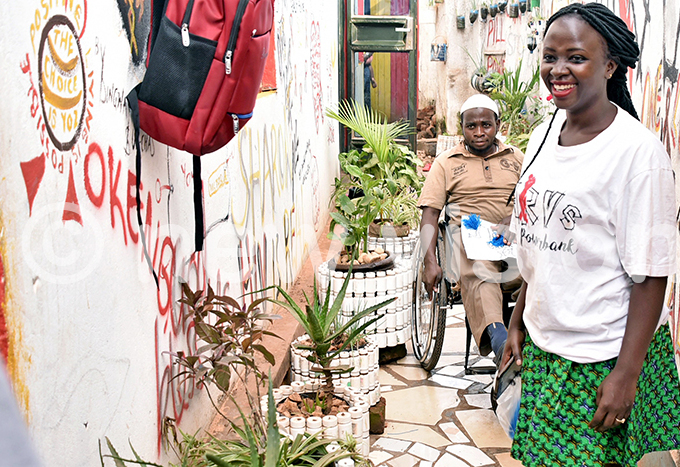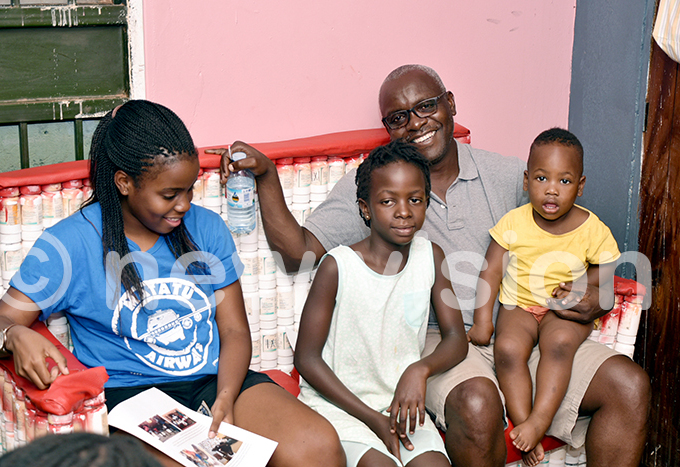Kemigisa changing the face of HIV/AIDS
Deprived of innocence “I was sexually abused at the age of six,” said the 33-year-old,” she says. Kemigisa was not molested by strangers, but by members of her family.
A drive through a busy slum of Nsooba, Kyebando in Kampala, leads us to the home of a 2018 Mandela Washington Fellow for young African Leaders, Barbara Kemigisa.
Kemigisa is clad in a green kitenge skirt and a white shirt with an inscription; ARVs my power bank.
She is standing by the roadside, staring at all cars, probably looking out for the big car, that Vision Group's Chief Executive Officer Robert Kabushenga, had described to her over the phone. She waves at us to stop.
She is in high spirits, but behind her umber skin colour and hearty laughter, is a soul that was denied a decent childhood and molested countless times at the age of six.
Together with a photographer, Kabushenga and his daughter Katisi Kabushenga, Kemigisa leads us to her house. Through a small red gate bearing different HIV/AIDS messages, you cannot miss her passion for the fight against HIV/AIDS.
The same messages are written on the white walls of the corridor leading to her three-bedroom house, where she trains children living with HIV/ AIDS from the community. Inside one of the rooms are chairs made out of tins that once contained antiretroviral (ARV) tablets.
Kemigisa pulls one stool on which she sits and shares her story. Deprived of innocence "I was sexually abused at the age of six," said the 33-year-old," she says. Kemigisa was not molested by strangers, but by members of her family.
Each of her uncles took turns on her whenever they felt like. As a result, Kemigisa who learnt she was HIV-positive 10 years ago, says she became a typical bad girl in school and led a reckless life.
She grew up knowing sex was just a game people played, with whoever crossed their path. "I became addicted to sex. I wanted to have sex with as many men as I wished, with no intention of falling in love," Kemigisa said.

Barbara Kemigisa in the corridor of her peer centre in Kyebando. Photo by Miriam Namutebi
Her sexual involvement with different partners led to a pregnancy she did not even know she was carrying until it was eight months. She says she thought she was just gaining weight like any other child.
She was only 15 years old at the time. Kemigisa, who was living with her stepmother, while her absentee father stayed in Kampala and her mother on the other side of Hoima was picked from school by her parents and her pregnancy terminated.
When she was taken back to school, she noticed friends were shunning her. They were embarrassed of her behaviour. Kemigisa soon looked for a way out of school. It was not long before she got it.
She burnt her mattress, an act that earned her canes and an expulsion, but she had to report back to the same school to sit her Ordinary Level examinations. She scored aggregate 24, emerging the best student in literature and English language. Another wrong turn After Senior Four, she came to Kampala to live with her father.
He was, however, disappointed by the reports he used to get about her. He got angry with her. "My father perceived me as a bad girl who was always jumping from one man to another. I was disappointed in him for not seeing my transformation. He was never present," Kemigisa said.
He always left home at 6:00 am and returned by dusk. Carrying with her a sense of frustration, Kemigisa ran away from home and found solace at the Old Taxi Park in Kampala, acquiring new friends.
Here she met a ‘guy' who wanted a relationship with her. "I opened up to him about my situation. He took me to his sister in Nankulabye, Kampala.
His sister took me to Watoto Church, which was then Kampala Pentecostal Church (KPC). I then joined the youth ministry," she says. Similar situation During one of our school outreaches, I noticed that other girls were going through the same kind of life I had.
I was hurt by one of the stories of the girls who informed me that she was being abused by an uncle who was paying her school fees. The victim could not report the incident to her mother for fear of not being believed.
Kemigisa admits that she did not know how to deal with the girl's situation at that time. Another student testified about having sexual relations with five girls, whom he claimed to be in love with.
It is then that she realised that the sexual network was a widespread problem.
Second pregnancy, depression
Kemigisa says depression, loneliness and being discriminated against, resulted in a sickness, which led to her extreme weight loss.
Instead of receiving treatment, Kemigisa was shocked to find out that her stepmother had connived with the nurse to have her tested for pregnancy.
The pregnancy results turned out negative and she was forced back home. Feeling betrayed, Kemigisa felt like there was nothing to lose any more.
It was on this count that the then 22- year-old got a boyfriend, the same boyfriend who had been pursuing her since they were in primary school. "I got pregnant after a month," she says.
Finding out she was positive
It was during her antenatal care that Kemigisa found out she was HIV-positive. On finding out… (pauses for a moment, eyes she glued to the wall). She says one of the hardest tasks was informing her father about her status and pregnancy.
"My father could not believe it when I told him that I had been introduced to sex by his brothers," she said.
"It cannot be," my father said. She saw no reason to tell him she was pregnant.
She left his home feeling unwanted and betrayed and took refuge at a friend's house in Kyaliwajala, a city suburb, but all did not go as she had envisaged it.
East or west home is best
Her roommate would sometimes lock her out of the house and the veranda became her home. Having more than one meal a day was always a miracle. For someone who was pregnant, this was unbearable, Kemigisa says her roommate preferred throwing away the food instead of giving it to her.
Becoming an HIV/AIDS activist
Telling people who wanted sexual relations with her was her first step to becoming an HIV/AIDS activist. Here, we are interrupted by Kemigisa's first child, Kourtney Dalene Mata, a jolly nine-year-old, garbed in a green and white patterned dress.

Daughter joins activism
Mata, who too is an HIV/AIDS activist like her mother, was born HIV-negative. However, this did not last long as she later got HIV from her mother through breastfeeding. Mata, who is also an activist describes HIV/AIDS as a small insect that grows inside one's body. She says children should not live like her.
Warnings
In pursuit of her activism, Kemigisa has all the literature written about her HIV story, hang on the walls of what she described as her tiny home, so that the men who were pursuing her, could see it for themselves and leave her alone.
This, she says, was the way she was going to deal with every doubting Thomas. Kemigisa says she would get guests, some of them interested in a relationship with her. She would excuse herself to go to the shops.
Upon return, she would find all gone, after reading the messages of HIV on the walls. The award-winning activist has had her confidence built after featuring on different media platforms. After sharing her story several times, she realised that it was a path she should take.
"My confidence was boosted from the words of encouragement that I got from the people who listened to my story," she says. She says she opted to raise awareness about HIV/AIDS since there were few activists in 2008 and 2010.
It became something she did for fun, as she always made sure she had everyone's attention when it was time for her to take her pills. While most use the pulpit for preaching, Kemigisa saw the church as a forum that she could use to tell her story.
It was on the church podium that she testified about having a fall in her CD4 count, hence preaching against the sexual network. Kemigisa has also appeared in Vision Group's Flair magazine, New Vision TV telling the world her story.
Marriage
"In 2015, I got married to an HIVnegative man and together, we have an HIV-negative son, Genesis Taala," Kemigisa says. "Much as I have gone through a lot does not mean that I have no value," she says.
This is what she also tells other girls out there, not to feel inferior about living with HIV/AIDS. Quoting Isaiah 60:15 — although you have been forsaken and hated,with no one travelling through, I will make you the everlasting pride and the joy of all generations, Kemigisa says that this was a confirmation she got from the Lord. We were taken into a spiritual moment when Kabushenga also shares Psalm 118:22 —
The stone which the builders rejected, has become the cornerstone, Kabushenga said in reference to Kemigisa's story.
MAKING AN IMPACT
Vision Group Chief Executive Officer (CEO), Robert Kabushenga who learnt about Kemigisa's plight through social media, said he was fascinated at how she turned her life around.
You would describe my daughter Katisi as a privileged child, being the daughter of a CEO. Hearing Kemigisa's story, Katisi, says she learnt that one can turn their situation around no matter how bad it is.
"You are an inspiration. You decided you could not live the life you were living before anymore. You chose to use your situation to change other people's lives," Katisi said.
PLANS
Barbara Kemigisa is looking at creating a village for young people living with HIV/AIDS. She hopes to acquire 50 acres of land, where people will have a normal life. Kemigisa says a normal life is one where people living with HIV/AIDS are happy and accepted.
A place where they are free to talk about their status without feeling stigmatised. "Young people are passionate about doing certain things but are let down by the environment in which they live.
My goal is to change the face of HIV. Pointing at her small rented house, Kemigisa says space is not adequate for her dream. Kemigisa swallows three pills a day, while Mata swallows 11 tablets.
She wears her ARV bottles as her signature look and goes to the communities and streets to show the burden of people living with HIV/AIDS.
"The HIV/AIDS talk is a hard one. It is tough love. We tell you that once you acquire HIV now, it is a choice that you would have made as you have a choice to take your partner for tests," Kemigisa says.
"You cannot have heard all this talk and continue to sleep around. I will not be victimised into feeling sorry for people. People have to learn to be responsible for their lives," she adds.
This story first appeared in the New Vision of April 3, 2019